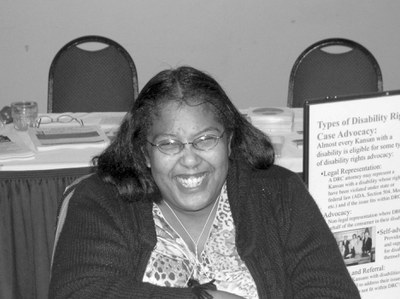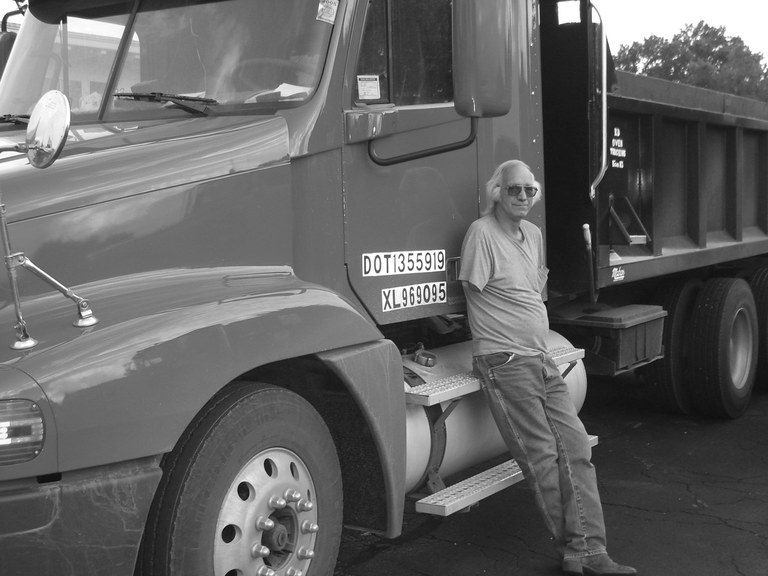Employment
DRC provides employment advocacy to client

Lewis Gladue has always loved working in the food industry. “I love meeting people and trying out new food,” said Lewis. In August 2015 Lewis was working to find employment with his job coach through Bert Nash, the community mental health center in Lawrence. He was excited to learn Taco Johns in Lawrence was hiring. He applied right away. He was called for an interview with the assistant manager, who was very impressed with his experience, and he was told he would know something the following week.
When Lewis went in to check on his application, he was told by the manager he would not be hired because they already had someone with a disability working there, and they wanted someone higher functioning. This devastated Lewis. “I broke down in tears. It made me feel worthless. My job coach encouraged me to contact DRC,” he said.
DRC Kansas was able to negotiate a settlement for Lewis, which included sensitivity training for all the staff of Taco Johns. Lewis is currently employed at Little Caesars and is thankful for DRC’s legally-based advocacy. “I am very appreciative of the help DRC gave me. They kept me in the loop and were patient with me. I will always refer anyone to DRC if they need help.”
DRC helps client received needed VR services

Jeanette is a woman receiving SSDI and a current VR client. She had an IPE in place that allowed the purchase of a vehicle but had such significant communication problems with VR due to changes in counselors and vacations that she ultimately applied for a loan to get the van she needed because she was in danger of losing a highly sought after job opportunity if she could not get dependable transportation issues resolved. Because of her use of a wheelchair for mobility, she could not access alternative transportation on a dependable basis critical to this job. Jeanette contacted DRC for help in with her IPE shortfalls. DRC’s advocate helped Jeanette to request VR to reconsider her needs. Through this process the amount that had been previously approved was applied toward the repayment of her KATCO loan as an amended IPE service needed to maintain employment. Also, VR agreed to complete the cost of the van and needed adaptations and the client has been able to successfully maintain her employment as a caseworker for nearly a year and anticipates this as a long term career. Jeanette comments that she couldn’t have done what she has with the assistance of the DRC advocacy team.
DRC Helps VR Consumer Obtain Specialized Training

Through DRC’s representation and professional advocacy services, Jennith Lucas’s goal of becoming a Special Education teacher was greatly improved through specialized training. As a recent high-school graduate, Jennith moved to Kansas from Georgia in 2007. She has Macular Degeneration, which has left her with limited vision, and will ultimately result in blindness. Because of her vision impairment, Jennith is eligible for Kansas Vocational Rehabilitation (VR) services and supports to assist her in attaining full-time employment as a teacher. Her VR Counselor recommended that she attend the University of Kansas (KU) while she still had sight. VR funded the education, and Jennith began classes in January 2009. Jennith experienced difficulty in receiving the requested equipment and tools that she needed from KU, and she found that intense studying without these vision aids expedited her vision loss. This motivated Jennith to research and she discovered Blind, Inc., in Minnesota. Blind, Inc. provides a program which offers an immersive six-month training program to help people with blindness learn strategies and develop useful skills to accommodate their vision impairments. Jennith applied to have the Kansas VR program approve and fund her participation in Blind, Inc. but her request was denied. She approached DRC because of its role as the Client Assistance Program, which provides independent advocacy services for recipients of Rehabilitation Act funding, including the VR program. DRC attorneys and advocates contacted Jennith’s VR counselor to appeal the decision denying her request for funding to attend Blind, Inc. The appeal letter stated the legal and real-world arguments why Blind, Inc. would be advantageous for Jennith’s individual situation. Blind, Inc. provides a different approach to an individual who is losing or has recently lost their eyesight. Because of DRC’s advocacy, VR reconsidered and approved Jennith’s request to attend the program, which she started in July 2009. Jennith credits DRC’s advocacy as the key reason why she obtained access to Blind, Inc.’s specialized training program.
DRC Helps Kansan Rev Up Trucking Business

Richard Owen is a truck driver from Bison, Kan., and in June 2005, after months of waiting for action from Vocational Rehabilitation (VR), his shiny new red truck arrived along with the rights to run his own trucking business. Richard is an early DRC Client Assistance Program (CAP) success story. DRC acquired the CAP in April 2005.
In 1975, Richard lost his right arm above the elbow while working on an oil drilling rig. After many challenges, Richard began working as a mechanic, but was soon unable to keep up with job demands. Three years later he started driving a hauling truck with a manual transmission using his left arm to shift gears. Then, in September 2004, the Kansas Department of Transportation revoked his commercial driving license because he was driving without a required medical waiver, which had been made mandatory by changes in licensing laws.
According to the Kansas Department of Transportation medical evaluation summary, to receive a medical waiver, Richard would have to take a driving test, submit a state motor vehicle driving record (MVR), acquire a Skill Performance Evaluation (SPE) Certificate and obtain a medical examination report from an orthopedic surgeon stating that he is physically qualified to drive a commercial motor vehicle (CMV). These barriers were unmovable without help from VR.
Richard contacted VR for assistance. VR issued him his fifth prosthetic arm. Unfortunately, the arm, like others before, was not compatible with the functions needed to successfully regain his commercial drivers license and continue driving a truck.
“No matter what kind of arm they put on me, I wouldn’t be able to operate a vehicle,” Richard said. “I did not get the proper rehab treatment 20 years ago, so I’ve lost about 90 percent of the movement in my right arm.” Richard was told to search for other career opportunities.
Richard, understandably frustrated with VR, contacted DRC for help. As a result of DRC’s advocacy, VR set up an appointment for Richard with a physiatrist in Hays, Kan. Richard was told that he would not benefit from a prosthetic arm because of the lack of movement in his arm and the space in the truck. To continue driving trucks, Richard would have to have a vehicle with an automatic transmission.
“I lost about $36,000 in income trying to figure this all out. But once DRC starting helping me, things got done.” Richard said.
In January of 2005, Richard’s employer, Bosch Hauling, sold out the business, leaving Richard with no job, no truck and no license.
DRC approached VR and helped Richard submit a proposal for owning his own trucking company. Richard’s business plan was accepted and VR purchased a 1999 Freightliner truck and paid for the initial company start up costs.
Richard’s truck arrived in June and after successfully completing a driving test, Richard has been contracting out work for his company, RD Owen Trucking.
.png)





